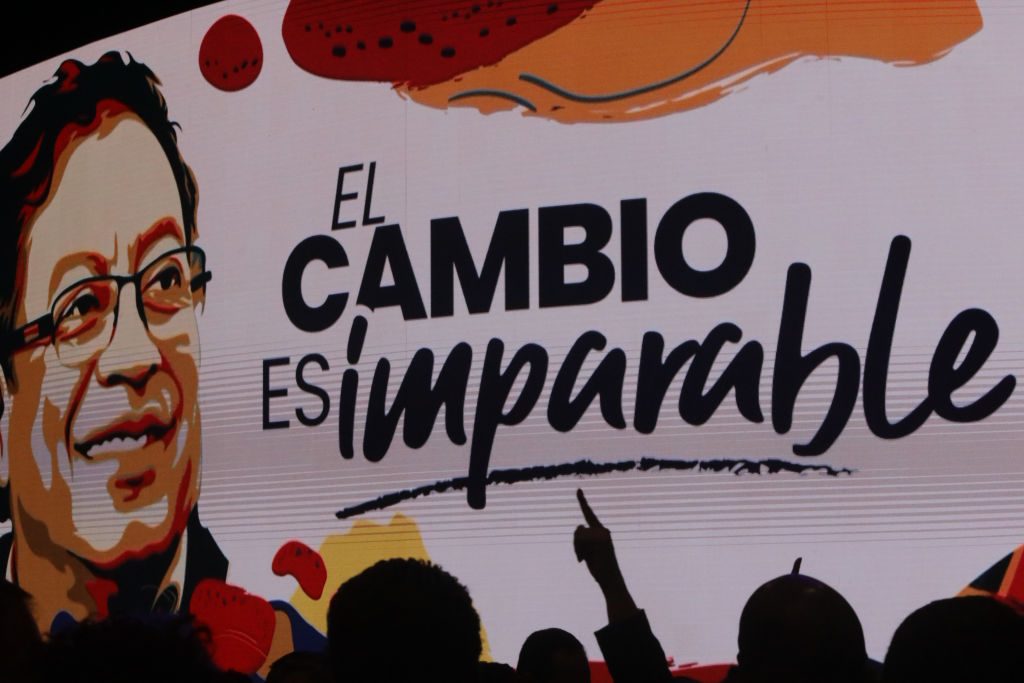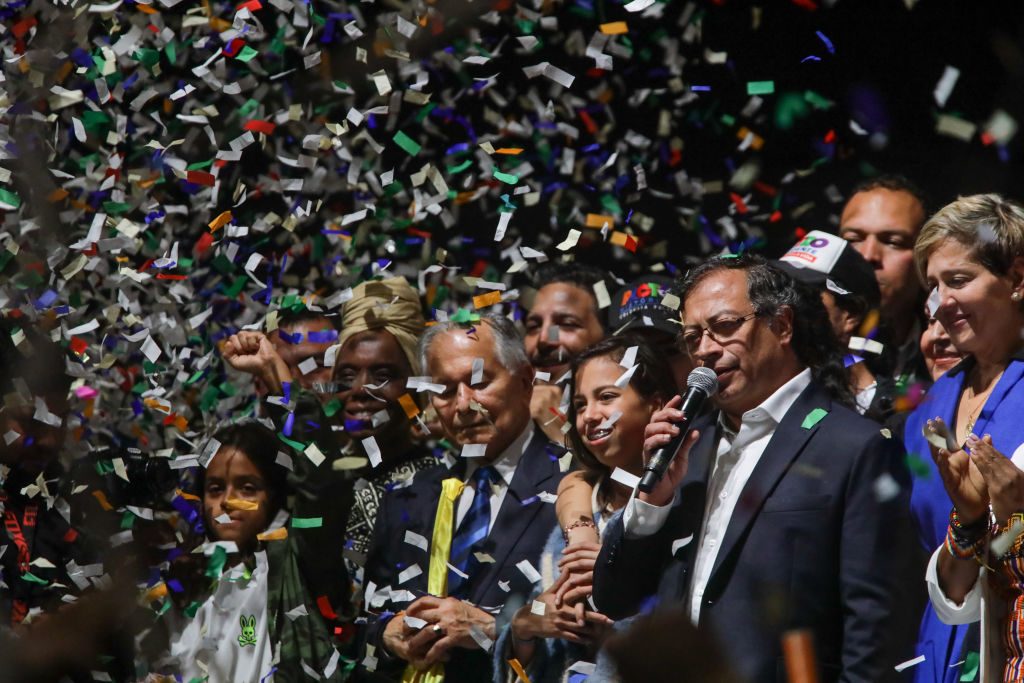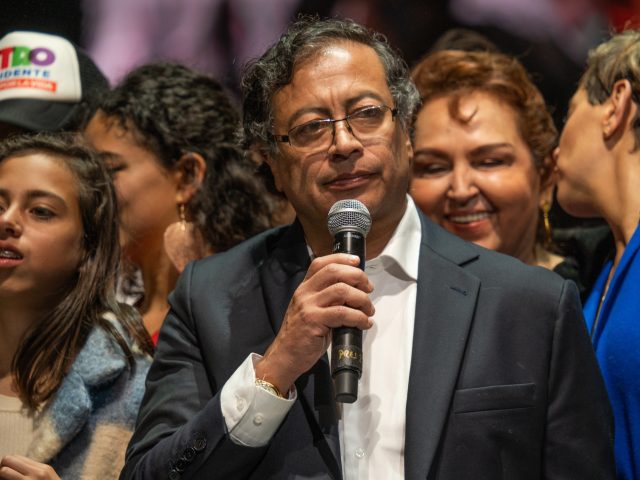Marxist former mayor of Bogotá and ex-member of the terrorist M19 guerrilla organization Gustavo Petro declared victory Sunday night in Colombia’s presidential election – despite dismissing the entire endeavor as rigged and calling Colombia’s top election official a “liar” days prior.
Colombia’s Observatory Mission for Elections (MOE), which oversaw the vote, documented 148 complains of election “irregularities” by 3:30 p.m. local time on Sunday. By the time voting stations closed, that number had soared to 393 reports.
Among the alleged irregularities, according to the Colombian newspaper El Tiempo, were “problems with the vote card markings,” “vote buying,” threats to voters, and candidate propaganda located within voting centers.
El Tiempo added that at least two people were assassinated during the voting process and an unknown assailant bombed one voting station in Norte de Santander, northeast Colombia.
Despite Petro insisting that the election would not be free and fair and calling voting registrar Alexander Vega a “liar” for claiming otherwise, Petro did not indicate on Sunday night that he would challenge the result of the election that made him president-election.

Gustavo Petro, the leftist former mayor of Bogota, has been declared the winner of Colombia’s presidential election in Bogota, Colombia, on June 19, 2022. (Juancho Torres/Anadolu Agency via Getty Images)
Rodolfo Hernández, the elderly “outsider” businessman Petro narrowly defeated, also accepted the results of the election.
Petro’s radical leftist “Historic Pact” political coalition received 11.3 million votes, according to the MOE, or slightly over 50 percent of the vote. Hernández received about 47 percent of votes, leaving a minority of blank protest votes rejecting both candidates. The Colombian system typically requires two presidential elections: one featuring all candidates and, if no candidate receives 50 percent or more of the vote, a run-off election between the top two candidates. Petro won the first round of voting in May, but not by enough to prevent a runoff.
Petro, a former mayor of the capital, won the nation’s big cities and its coasts; Hernández won over the heartland, where most of those affected by over half a century of Marxist guerrilla violence and drug trafficking live.
Petro lost the 2018 presidential election to incumbent Iván Duque largely because he had failed to secure votes in the coastal Caribbean departments (the formal term for state-level divisions) Petro appeared to make significant gains in the nation’s east and coastal north from 2018.
El Tiempo, citing the Colombian MOE, reported late Sunday that the vast majority of election irregularity reports came from Antioquía department, followed by Valle del Cauca, Atlántico, Risaralda, and Bogotá. Of these, Petro won Valle del Cauca, Atlántico, and his hometown of Bogotá. Antioquía’s regional capital, Medellín, is the conservative stronghold that birthed the longstanding conservative movement of former President Álvaro Uribe after enduring one of the worst waves in the country of drug-related terrorism in the 1980s and 1990s.
El Tiempo noted that an election witness for Petro’s Historic Pact “was assassinated” during the elections in western Cauca, and at least one bomb attack occurred. Another man identified as a pro-Petro “human rights defender” was also killed.
The newspaper noted that the most common election “irregularity” reported was that the ballot cards used by voters appeared to have markings on them before the voter had a chance to check a candidate box, rendering them invalid. Four major cities, including Bogotá and Medellín, also reported evidence of “the exchange of money, food, and mobilization of people towards voting centers,” which is illegal.
The right-leaning magazine Semana indicated that the majority of irregularities documented in Antioquía occurred in areas where terrorist guerrillas are known to operate.
Petro had predicted a rigged election as recently as Thursday.
“The registrar [Vega] is lying,” Petro said in an interview on Colombia’s Caracol radio that day, referring to the nation’s top election oversight official, Alexander Vega. “He says that we have guarantees and that is not true. He told me that they allow technical audits, but that is looking at 20 million lines of algorithms and one line could result in 100 more or fewer votes. That happened already.”

Gustavo Petro, a current senator, defeated right-wing construction magnate Rodolfo Hernandez in Sunday’s run-off election. Figures showed he took 50.5% of the votes, defeating his rival by more than 700,000 ballots to become Colombia’s first left-wing leader. (Juancho Torres/Anadolu Agency via Getty)
Petro claimed that the first presidential in May was rigged against him, even though he won it.
“We do not have the guarantees to tell the people that this software is trustworthy,” Petro insisted. “We saw a fault at 500 tables [voting stations] where we lost 500 votes and Rodolfo Hernández won 500 votes – it’s not the judge’s fault either because it is an algorithm issue.”
“He [Petro] and all of the candidates have received all the guarantees, among them information auditors for the software, the presence of election witnesses, and international observation missions,” Vega said prior to the Caracol interview in response to Petro’s first round of attacks on him. “The clear message to Dr. Gustavo Petro is that he should respect and accept the results the way he has in every other election in which he has participated.”
Petro appears to be heeding that advice, as the election results favor him.
The president-elect delivered a 40-minute speech on Sunday night promising that he would welcome political opponents to dialogue and compromise while president, telling his own voters – after years of burning down cities and rioting – to abandon “vengeance” and “hate.”
“The elections show two Colombians close to each other in terms of votes. We want Colombia, amid its diversity, to be one Colombia, not two,” Petro said. “And for it to be one Colombia, in that enormous multicolor diversity that we are, we need love.”
“Rodolfo Hernández’s over 10 million votes are welcome in this government,” Petro promised.
“Maybe we don’t understand each other a lot of the time, but on the part of this government that is starting there will never be political persecution, judicial persecution, there will only be respect and dialogue,” Petro said.

COMMENTS
Please let us know if you're having issues with commenting.